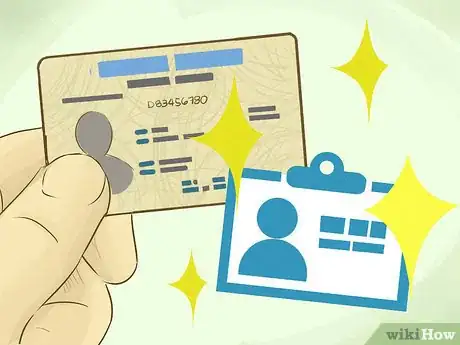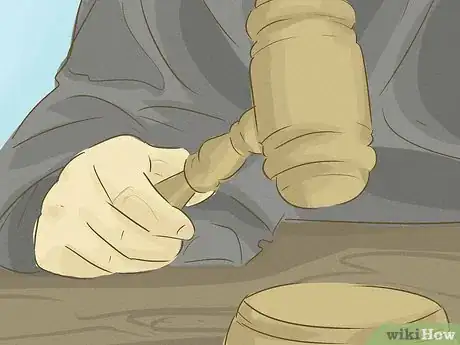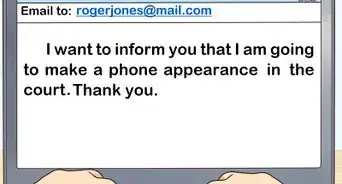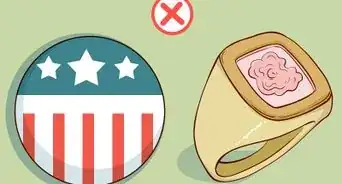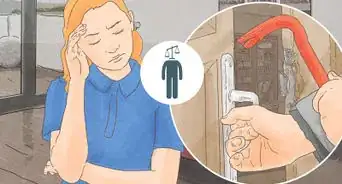This article was co-authored by Clinton M. Sandvick, JD, PhD. Clinton M. Sandvick worked as a civil litigator in California for over 7 years. He received his JD from the University of Wisconsin-Madison in 1998 and his PhD in American History from the University of Oregon in 2013.
This article has been viewed 75,847 times.
Serving on a jury is an important responsibility, and a valuable civil right. It can also be an educational, entertaining, and meaningful experience. Jurors are chosen from among randomly-selected members of the community to decide civil and criminal matters. You cannot guarantee your seat on a jury, but ensure your own eligibility to serve and try to maximize your chances of being selected.
Steps
Checking Your Eligibility
-
1Be legally qualified to serve. You cannot serve on a jury unless you meet certain criteria. To serve, you must be
- A United States citizen;
- At least 18 years of age;
- A resident of the judicial district in which you are called to serve;
- Proficient in English;
- Mentally competent; and
- Not a felon, unless your civil rights have already been restored.[1]
-
2Make sure you’re not exempt. Some groups are exempted from jury service because serving on a jury would interfere with their employment. These exempt groups are:
- Active duty armed forces members;
- Professional firefighters;
- Police officers; and
- Federal, state, or local public officials who work full-time in that position.[2]
Advertisement -
3Get on the right lists. Jurors are randomly chosen from lists kept by the government. The two largest and most commonly used lists are the Department of Motor Vehicle’s records of licensed drivers and state ID holders, and the Secretary of State’s records of registered voters.[3] In order to maximize your chances of being selected to serve on a jury, register to vote and get a driver’s license or state ID card.
Getting Selected from the Jury Pool
-
1Attend your jury service date. The first step to getting selected from the jury pool is to attend when summoned for jury duty. Dress professionally and arrive early to the location indicated on your jury duty summons. By dressing professionally, you will make a good impression and indicate to the court that you are taking the prospect of jury service seriously.
-
2Have free time. Potential jurors may be excused if serving would be an unreasonable hardship on them or their families. For example, teachers and students who would need to miss classes are often excused.[4] Some jurors will ask to be excused or rescheduled due to temporary scheduling conflicts.[5] If you have free time to serve on a jury, you will remain in the jury pool after many of your fellows have been excused.
- Grand juries and trial juries are selected from similar pools of potential jurors. However, since grand jurors sit for as long as several years, they are much more likely to be composed of retired persons and others with particularly open schedules.
-
3Understand how lawyers pick jurors. Jury selection, also called ‘’voir dire’’, is the process by which the attorneys on both sides pick jurors from the jury pool and dismiss the others. The prosecution (or plaintiff in civil cases) and defense will take turns asking questions to the jury as a group and as individuals. Based on how potential jurors answer, the attorneys will take turns excusing the members of the jury pool whom they don’t want on the final jury.[6]
-
4Be impartial. During jury selection, the attorneys will be trying to discover any biases or impartiality among the potential jurors. Any potential juror who seems like he or she might be biased for or against the defendant is likely to be excused. To maximize your chances, downplay your own biases.
- For example, if you have a close friend or relative in law enforcement, the defendant’s counsel may assume that you have a pro-law enforcement bias and are more likely to be prejudiced against the defendant. The defense is likely to excuse you for that reason.[7]
-
5Watch your body language. Attorneys will observe how you are sitting and your facial expressions during jury selection.[8] Some jurors will unconsciously fold their arms when listening to something they don’t agree with, or nod along with statements they do agree with. Try to appear neutral and not communicate your opinions through your expressions or gestures.
-
6Maintain a neutral internet presence. Sometimes, attorneys will search for individual jurors online to try to learn more about their backgrounds. If an attorney searches for you, he or she will be looking for details about your opinions and lifestyle to see how they compare to the interests of his or her client.[9] You can keep appear more nondescript and neutral online by limiting the amount of political or religious messages you share publicly and hiding any photos that you wouldn’t necessarily want an employer to see.
Warnings
- This article is intended as legal information and does not provide legal advice. If you need legal advice, contact a licensed attorney.⧼thumbs_response⧽
References
- ↑ http://www.calbar.ca.gov/Public/Pamphlets/JuryDuty.aspx#1
- ↑ http://www.uscourts.gov/services-forms/jury-service/juror-qualifications
- ↑ http://criminal.findlaw.com/criminal-procedure/how-are-potential-jurors-selected.html
- ↑ http://www.marketwatch.com/story/want-to-get-out-of-jury-duty-heres-how-2011-05-09?page=2
- ↑ http://www.marketwatch.com/story/want-to-get-out-of-jury-duty-heres-how-2011-05-09?page=2
- ↑ http://lifehacker.com/eight-myths-about-jury-duty-debunked-1538152456
- ↑ http://mentalfloss.com/article/62514/9-things-lawyers-look-when-picking-jury
- ↑ http://mentalfloss.com/article/62514/9-things-lawyers-look-when-picking-jury
- ↑ http://mentalfloss.com/article/62514/9-things-lawyers-look-when-picking-jury
About This Article
While you can’t guarantee your seat on a jury, you can try to maximize your chances of being selected. If you want to get selected from the jury pool, make sure to attend your jury service date. Dress professionally and arrive early to make a good impression. During the selection process, attorneys will be trying to discover any biases among potential jurors, so be as impartial as possible when answering questions. You'll also want to keep your body language as neutral as possible, so avoid folding your arms or nodding your head when you agree or disagree with something someone is saying. To learn how to make sure you're eligible to serve on a jury, keep reading!


